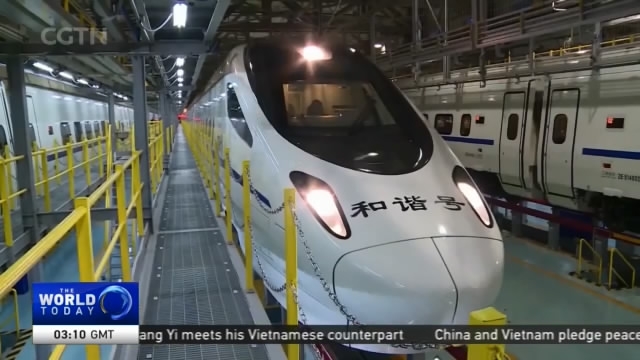
11:27, 02-Apr-2018
China Boosts Malaysia's Rail Links: China-led projects bring economic benefits

China is busy upgrading outdated rail systems and building new rail lines. In Malaysia, a Chinese company is also assembling trains to run on those new or improved rail lines, providing jobs and boosting business in the process. Rian Maelzer reports.
From Mombasa in East Africa to Malaysia in Southeast Asia, China is transforming transport in East Africa, financing and building several multi-billion dollar rail lines including the Mombasa-Nairobi railway in Kenya, which will later link to Uganda, and a line from Addis Ababa to Djibouti. Southeast Asia is another region where state-owned Chinese rail companies are deeply involved -- starting work on a rail link from China's south through Laos and on to Bangkok, and building a high-speed rail line in Indonesia. But China's involvement is greatest in Malaysia.
RIAN MAELZER PERAK, MALAYSIA "Malaysia recently completed the expansion of the capital city's light rail network, is building a new mass rapid transit system, electrifying and double tracking the main north-south rail line, and building a new rail line from the big ports on the country's east coast, through the capital to the underdeveloped east coast."
China is involved in many of those projects, including financing and leading construction of the 14 billion dollar East Coast Rail Link. In Central Malaysia, meanwhile, China Railway Rollingstock Corporation has been assembling hundreds of train sets for the country's suburban rail, light rail and long distance electric train systems.
JIANG ZHENGGUANG, GM CHINA RAILWAY ROLLINGSTOCK CORP. "Malaysia has a solid railway network, but it is outdated, so there are big opportunities here."
Around 80 per cent of the people working for CRRC here are local.
MOHAMMED AL-AMIN ZAINI YAIF, ENGINEER CHINA RAILWAY ROLLINGSTOCK CORP. "I have been sent to China three times for additional training. It has helped boost my skills, helped me develop my career."
JIANG ZHENGGUANG, GM CHINA RAILWAY ROLLINGSTOCK CORP. "Malaysia isn't strong in railway equipment production. So entering Malaysia's market, we bring new opportunities for Malaysia in this field. We will also help to cultivate local talents in manufacturing and management. We insist on localizing production and purchasing, boosting local suppliers and creating jobs."
But the undoubted prize for which China will compete with Japan, South Korea and European countries is the planned 350km, 15 billion dollar high-speed rail link between Kuala Lumpur and Singapore. It faces stiff competition. But China will hope that by already playing the leading role in Malaysia - and ASEAN's - rail upgrading drive, it will have the edge. Rian Maelzer, CGTN, Perak, Malaysia.

SITEMAP
Copyright © 2018 CGTN. Beijing ICP prepared NO.16065310-3
Copyright © 2018 CGTN. Beijing ICP prepared NO.16065310-3